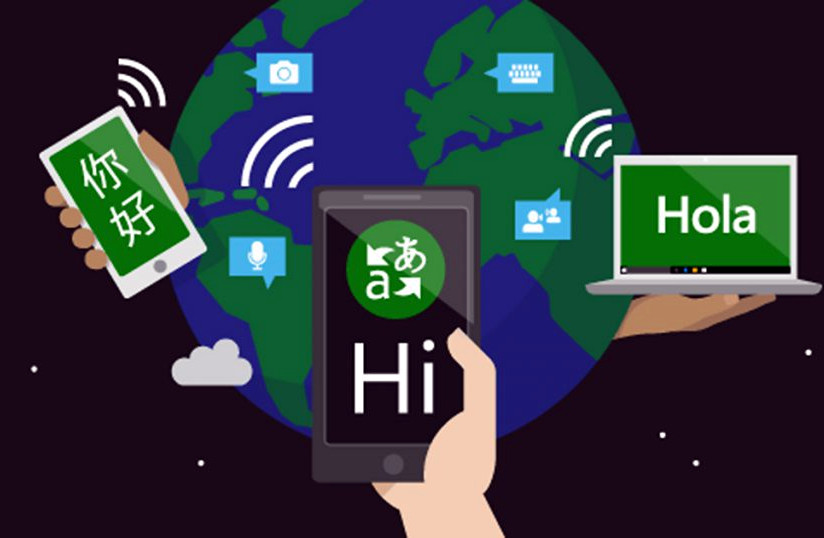Taiwanese students spend thousands of hours studying English. Yet after three to five class-hours of English as a foreign language every week for more than nine years, most students can barely utter a sentence of English. The government’s “Bilingual Nation 2030” policy would do little to change this. As artificial intelligence (AI) technologies would soon be able to translate in real time, why should students squander so much of their youth and potential on learning foreign languages?
AI in our life
AI might save students time, but it should not replace language learning. Instead, the technology could amplify learning, and it might also enhance our humanity.
Language makes us unique from other animals. It defines our essence as cognitively and socially complex creatures, and this is where we differ from AI.
The human essence would become increasingly important in a society where the workforce has been radically transformed by AI. Many jobs would be replaced with technology and many more would require humans to work with AI. People who can do things that AI cannot and who can work well with the technology would become the most competitive and successful.
In the coming “Age of AI,” workers would need to be extra human to compete with not only other people, but also AI. Education, particularly foreign language education, would have a pivotal role to play.

The importance of languages
Becoming bilingual is one way to enhance humanity and intelligence. First, bilingual brains have been shown to be smarter, more creative and better at problem-solving. Second, learning foreign languages can increase a person’s empathy and ability to understand and relate to others. Third, investing effort into mastering any skill provides value and meaning to people.
In the brains of bilinguals, two languages are always active. This creates more neural connections and denser gray matter in the brain than in monolinguals. As gray matter is responsible for processing information and performing cognitive tasks, it is unsurprising that several studies have found that bilinguals possess superior cognitive abilities for attention, focus, creativity and problem-solving.
Although young bilinguals build vocabulary slower, they learn to manage their attention more efficiently by switching back and forth between languages. This is why bilinguals are often more efficient, flexible and faster at multitasking. In tests of association and creative uses for objects, bilinguals often outperform monolinguals. The ability to focus attention and engage in creative thinking, especially for convergent thinking that requires focused attention, can give bilinguals an edge in problem-solving.
Most people think that the only function of languages is to send and receive information, but many overlook its social function. Much of language is devoted to functions such as greetings, requests and polite phrasing, whose primary function is to build and maintain relationships.
Intercultural skill
In the process of developing high proficiency in foreign languages, bilinguals become more aware of language and culture differences. This helps them better understand and share feelings with others and become more open-minded and tolerant of differences.
These are crucial skills in intercultural experiences such as traveling, socializing, sales and negotiations. Studies have shown that children who grow up in multilingual environments are more effective communicators because they can account for others’ feelings and perspectives.
Mastering a skill such as foreign languages can make a person’s life meaningful. In the Age of AI, to live a good life that has value is likely to become more difficult, yet more important than ever before.

The dilemma between convenience and skills
A good life should not be confused with a convenient life. If everything you want can be done by AI, would you feel good? Would you have any sense of self-worth? Would your life have any meaning?
Anything of value or meaning in our life comes from struggle, difficulty and friction. We can see this in the “IKEA effect”: People attach much more value to a cheap desk if they put effort into assembling it themselves. The effect takes on greater importance in more abstract human endeavors, such as sketching a portrait, throwing a three-pointer in basketball or fluently using a second language.
Apart from the cognitive benefits of effortful language learning, people also derive a more profound sense of purpose and meaning from persistently working to improve their language and communication abilities.
Of course, these cognitive, empathic and meaning benefits only come when people become skilled users of a second language. Sadly, this achievement is enjoyed by few Taiwanese students. For most, the thousands of hours of study are a hugely negative return on investment.
The role of AI in teaching
However, for teachers and students who know how to use AI, the Holy Grail of education is, for the first time in history, within grasp: personalized learning for all.
Services such as ChatGPT and its plugins — Bing Chat, Microsoft Office’s Copilot and Khan Academy’s Khanmigo — are poised to help teachers personalize lessons and assignments for students of different levels and interests, and to give learners access to personal tutors 24 hours a day.
With more personalized learning and access to personal language tutors any time and anywhere, the students in Taiwan with thousands of hours of language study could achieve a higher level of language ability than high-beginner or low-intermediate learners.
Taiwan’s panorama
Maybe then Taiwan could realize the kind of language learning goals set out in “Bilingual Nation 2030,” as well as the internationally recognized Common European Framework of Reference for Languages, which estimates that 700 to 800 hours of study should result in advanced level proficiency.
Maybe then, students would develop the cognitive and empathic skills to prevent being made redundant by AI. Students would not waste their time on meaningless memorization tasks and find meaning in learning from more personalized course content. Students would be motivated to learn more and communicate with others, and when they do, they would feel like they are living a more meaningful life.

